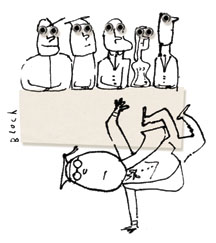
|
November 8, 2006: On the Campus
Illustration: Serge Bloch; Photo below by Hyunseok Shim ’08 |
Analyzing hip-hop’s voice
By Adam Gottesfeld ’07
Hip-hop culture has come to Princeton.
That’s the message that emerged from a symposium Oct. 6 as students packed McCosh 50 to hear rap artist Talib Kweli, Rep. Maxine Waters, grassroots activists, and Professor Cornel West *80 engage in a frank debate about the potential of hip-hop music to incite political change in post-9/11 America.
Hip-hop generally refers to a style of rap music that originated in the South Bronx in the 1970s. To its fans, it is a way of life, complete with break dancing, graffiti art, and its own urban fashions. “It’s more than simply the music. It’s what people read, it is how they interact with each other,” said Michael Rudoy ’07, organizer of the symposium. “Hip-hop has cemented itself as one of the strongest voices of American youth today. It deserves further understanding.”
The growing embrace of hip-hop at Princeton reflects how the campus culture is diversifying. Students who identify with the culture come from all races. Said Rafe Corkhill ’07, a hip-hop DJ: “The funny thing is that although there is this image of Princeton being a preppy white campus, people in that stereotype do listen to hip-hop and appreciate more than the music. They love going to the SYMPOH [student break-dancing company] shows and the BAC [Black Arts Company] shows.”
From the start, the symposium had as much pomp as a professional sporting event. Armed with his personal collection of vinyls, DJ Rafe spun the beats of rappers like Mos Def and Alchemist as the panelists entered the lecture hall. Moderator Jeffrey Johnson, a Black Entertainment Television personality, called them in one by one, describing Kweli as a “prophet among men” and West as “the smartest brother that got hair bigger than Don King.” The audience members rosefrom their seats and clapped for each speaker, with the loudest applause reserved for West, the Class of 1943 University Professor of Religion, who has released two hip-hop/spoken-word CDs, Sketches of My Culture and Street Knowledge.
The panelists disagreed over how the hip-hop community of artists and activists can realize its potential to spur real political change. “The response from artists lyrically is important. Talk often inspires action,” said Bakari Kitwana, co-founder of the first national hip-hop political convention.
But Waters, a Democrat who represents South Central Los Angeles in Congress, argued that activists will not achieve their potential until they pay attention to policy-makers who hold the real power.
“I hate to tell you, I don’t feel you, I don’t feel you yet,” she said. “I don’t see the hip-hop community out at all, at any of the big political rallies, rallies about the public policies of this country. When politicians see power and numbers, they gravitate toward them. The power of the hip-hop community to put people in office and take people out is so awesome if it is ever realized.”
West spoke of the paradox at the center of the debate. “The American mainstream obsesses with black creativism, but at the same time it gives a low priority to the social misery out of which this creativity flows,” he said.
As the symposium’s popularity suggests, hip-hop is emerging as a topic of political and academic discussion on campus. In 2005, a few students founded Hip Hop: Art & Life, a club dedicated in part to exploring hip-hop’s potential as a tool for grassroots political organization. It now boasts more than 180 members. “Our goal was to bring the positive aspects of the culture,” said Ezegozie Eze ’09.
To these students, the participation of academic and political figures such as West and Waters in talking seriously about hip-hop gives the culture credibility.
West released Sketches of My Culture while a professor at Harvard. Criticism of the CD by Lawrence Summers, who was then Harvard’s president, was one factor in a highly publicized rift between the two that preceded West’s decision to accept an offer to join Princeton’s faculty in 2002.
“It was important that the symposium was held at Princeton,”
Rudoy said. “If Princeton puts on an event like this, people are
going to respect what is going on. It is going to turn heads, whether
in the Ivy League or nationally.” ![]()
 Adam
Gottesfeld ’07, a Woodrow Wilson School major, is from Los Angeles.
Adam
Gottesfeld ’07, a Woodrow Wilson School major, is from Los Angeles.
MORE ON THE CAMPUS online: Click here to read “Fasting at Princeton,” by Joy Karugu ’09

To read our exclusively online On the Campus column, click here.
